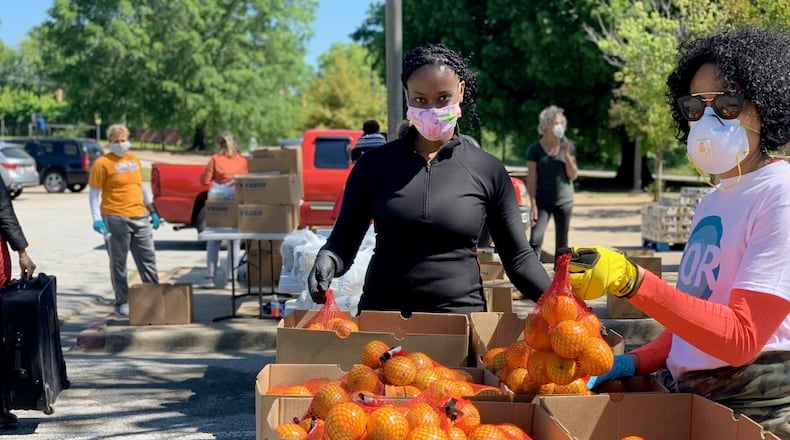CARE, the Atlanta-based nonprofit focused on humanitarian relief efforts in the world’s poorest countries, has brought one of its oldest programs to the U.S.
For the first time since launching in 1945, the CARE Package – a box full of food and supplies that went to families in war-torn countries after World War II – are being used to help families in metro Atlanta that have been impacted by COVID-19.
More than 10,000 meals have already been delivered with a goal of reaching 200,000 by summer’s end.
“Our board got it right in deciding we would expand to the U.S. and leverage some of the great work and learning that is happening around the world to do great things in our own community,” said Ryan Shepard, the executive director of CARE’s Atlanta Global Innovation Hub, which is spearheading the program. “This was the perfect time to relaunch the CARE Package.”
At the end of World War II, CARE packages – the source of the term we now use to describe boxes full of goodies sent to family, soldiers, and college students — contained surplus food items such as dried milk, jam, chocolate and cigarettes that had been warehoused. They went to families in European countries who needed post-war assistance.
The last CARE Packages were mailed out in 1968 bringing the program to a close until the 1990s when it was briefly revived to help families in the former Soviet Union and victims of the civil war in Bosnia.
Several years ago, the organization rebranded CARE packages to communicate a new mission – one that focused more on development and community empowerment than relief. CARE packages were marketed as tool kits that delivered financial programs, education and political advocacy rather than food.
But research showed that most people did not associate the organization with the ubiquitous term that it helped to brand.
“There have been a lot of discussions over the years about reviving the CARE Package concept very generally,” Shepard said. The organization wanted to find a way to connect the term they coined in a more meaningful way to the work they were doing, he said.
The COVID-19 pandemic presented an opportunity to connect a part of the organization’s expertise to its history, though it looks a bit different now than it did 75 years ago.
The revised model provides food to those in need, but also utilizes underemployed or unemployed gig economy workers to support food relief organizations such as food pantries and shelters. Many of these nonprofits have struggled to keep up with increased demand brought on by the pandemic. For example, a worker from Task Rabbit may be sent to work in food distribution at Purpose Built School’s Thomasville Elementary School, Shepard said.
A version for frontline workers allows individuals to sponsor a CARE Package with a gift card and personalized note as sign of appreciation for the sacrifices these workers are making during the pandemic, he said.
The Arthur M. Blank Family Foundation funded the effort which is also made possible through partnerships with other local nonprofits including Chris 180, Concrete Jungle and Purpose Built Schools Atlanta.
“It came together very quickly and we said this was a moment to press play. To stop deliberating about what is the best way to do the CARE Package and just try some things,” Shepard said.
While the Atlanta program is the anchor for the CARE Package Relief program, there are also similar efforts in the Bay Area and central California. The organization hopes to expand the program to other cities including Houston, Louisville and Chicago.
About the Author
Keep Reading
The Latest
Featured



